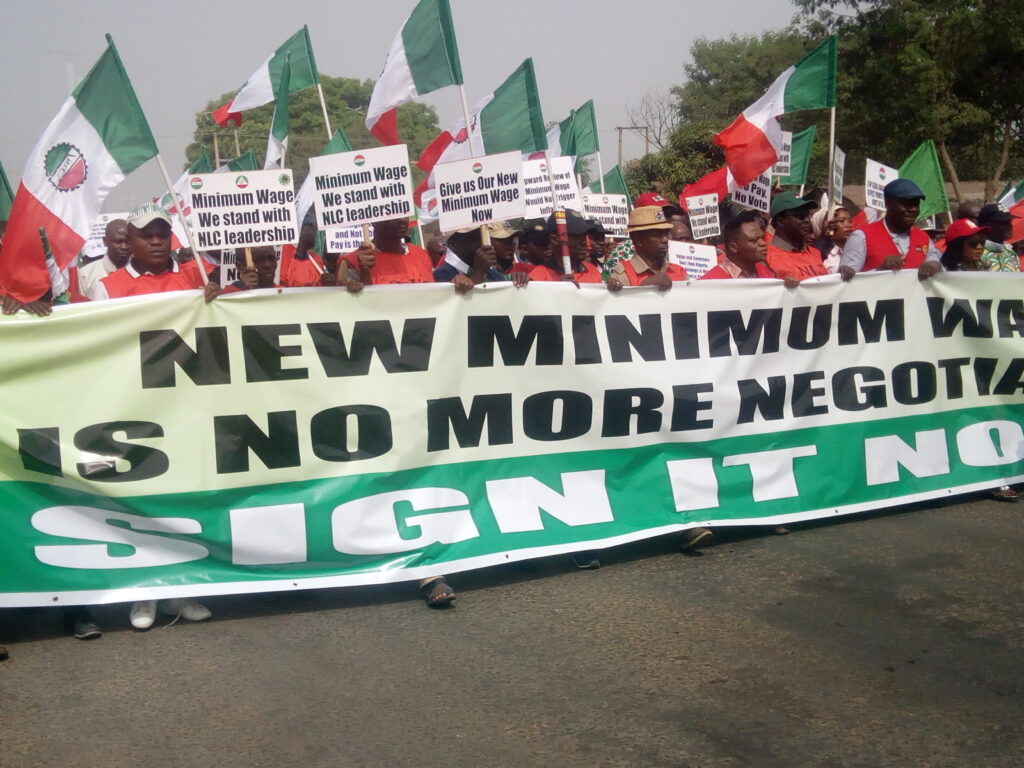The new minimum wage began with discussions and negotiations involving the Nigerian Labour Congress (NLC). The NLC declared an indefinite nationwide strike starting on Monday, June 3, 2024, due to the Federal Government’s failure to increase the proposed minimum wage above ₦60,000. The current minimum wage is ₦30,000 which expired at the end of March 2024. The Nigerian Government announced that a new minimum wage regime would come into effect on April 1, 20242.
Despite the government’s final offer of ₦60,000, which included a recent increase from an initial ₦57,000, the labor unions found the proposal insufficient and set a new proposal at ₦494,000.
This FG accused Labour unions of actions capable of crippling the economy and placing a burden of N9.5 trillion on the government. However, this request according to the president of the Nigeria Labour Congress (NLC), Joe Ajaero, is important so that workers can afford basic amenities.
“Our figures are based on objective realities around the nation and not based on some fantasy; but on what confronts us as workers around the nation. We want to be able to buy foodstuff, and housing, among others. Any wage that is below this living wage condemns workers to starvation,” he said.
Labour then reduced its demand from N494,000 to N250,000 after the Federal Government increased its offer of a new national minimum wage to N62,000.
Governors Differ On Minimum Wage
The federal government’s offer of a N62,000 monthly minimum wage was refused by state governors under the Nigeria Governors Forum (NGF). According to them, compelling them to pay the proposed minimum wage will have consequences.
The governors said a forced wage bill on the states could lead to the retrenchment of about 40 percent of workers in the states, while citing that most of the states were heavily indebted due to loans taken by their predecessors and could not afford the new minimum wage.
In response to this, organized labor warned some of the governors not to plunge the country into a state of resentment, misery, and impoverishment through their wrong advice. They added that governors can pay a minimum wage above ₦60,000 if they minimize corruption and cut the high cost of governance in their states.
Tripartite Committee on National Minimum Wage
On June 10, the Tripartite Committee on New National Minimum Wage submitted its report to the federal government. Recall that President Bola Tinubu inaugurated the 37-member committee, headed by Bukar Aji, on January 30, in line with the Minimum Wage Act of 2019. The committee recommended a new national minimum wage for Nigerian workers across both public and private sectors.
However, few conclusions have been reached by the committee after several negotiations with labor. The Tripartite Committee urged organized labor to reconsider the amount it is demanding as the national minimum wage, citing several economic implications. However, labor accused the Tripartite Committee chairman of lacking knowledge of the hardship and suffering workers and other Nigerians are going through.
“We may wish to remind the chairman that a bag of 50kg Rice is about N80,000, a decent tuber of yam is about N7,000; garri is N3,500 for half paint bucket, bread is N2,000 per loaf, meat is about N6,000/kg, oil is about N2,000/75L, electricity is about N50,000/month, while transport is about N3,000 daily to and from Gwagwalada to Berger in Abuja and N4, 000 from Ipaja to Lagos Island etc.
“The chairman should know that our wages are supposed to meet these basic needs and others and these are some of the realities that he asked us to base our demands on which we have done since the beginning of the negotiation exercise.
“It is rather disappointing that the government’s offer appears disconnected from these market realities. When we requested a breakdown of what constitutes the government’s offer, the response was not forthcoming,” a labour negotiator said.
Expert Provides A Way Out
Victor Aluyi, an economy expert, has advised the union to focus on policies that will make life easier for people instead of consistently demanding a 250,000 naira minimum wage.
According to him, if labor achieves a 250,000 naira minimum wage without corresponding productivity, the country will be dragged back to square one in a couple of months.
“Trying to increase wages about tenfold without the accompanying productivity indicates a high tendency for inflation. So even if labor gets 250,000 naira without the accompanying productivity, in a couple of months we will be right back where we are. The inflation tendency will create a situation wherein that purchasing power will be reduced, and that would not necessarily achieve what labor is looking for.
“There should be some adjustment based on an inflationary trend that may land us at 250,000 naira or lower than that. Labor would probably want to press the government on policies that would make life easier for people and encourage them. It becomes very difficult for labor to achieve that 250,000 naira from a government agreeing to pay 62,000 naira.”
He opined that the 250,000 naira minimum wage demand is not realistic and should be set at a much lower amount.
